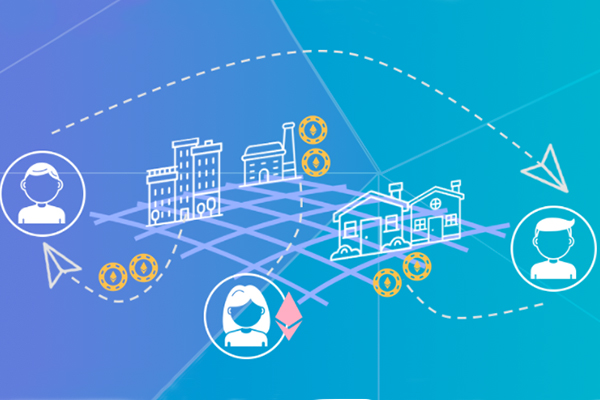
A majority of the economic assets of the world are held in terms of property. Henceforth, this Real Estate industry is starting to make use of various new-age technologies to make better sales and more transparent deals.
Technologies like Artificial Intelligence, Virtual Reality, Augmented Reality, Internet of Things, Blockchain, etc. have begun to be used in this industry. Some building/real estate firms have started using AR/VR to give their customers a realistic view of the projects even before they have been developed. The use of AI can be seen in websites and in chatbots which help in a more personalized advertisement, which is not only more effective but also less time and money consuming.
One of these technologies that are highly efficient in their domain and can prove extensively useful in industries, is BLOCKCHAIN. Its utility is such that many industries have lately begun implementing it to get positive results. Real Estate industry, isn’t lagging behind. Traditionally, there are several traits of the real estate industry that can pose a problem for most people. A few of them are:
1. Confined to usually Upper Class: As an investment, it has more or less, been confined to the rich folks. This is because very few alternative investments provide as much passive income as real estate does. However, investing in this sector comes with some barriers i.e. financing, credit score, cash requirement, going through a lot of middlemen and whatnots. Several visits to the property, dealing with middlemen, all this demands time and money, which often leads to usually rich people investing in it.
2. Risk of Fraud: Very often deals are based on paper or word of mouth too in some cases, which leads to a higher risk factor. Risks can be of delayed possession, what you see is different from what you get, illegal buildings, unapproved projects, fraudulent agency, etc.
3. Lack of Transparency: Many builders use illegal properties to launder money and that makes the sector less trustworthy and less transparent. This does not only affect certain projects but affects the overall reputation of the sector.
4. Difficult to Liquidate: Liquidating refers to turning an asset into cash as and when required. An asset that can be quickly converted to cash, is said to be easily liquefiable. Real estate investments are not easily liquefiable because of a few factors, i.e. pricing, location, amenities and more.
Due to these factors, the traditional Real Estate Industry is somewhat lagging behind its actual potential. However, this changes with blockchain. As the name suggests, blockchain is a chain of blocks. Each transaction is put into a block, then the next block is connected to the previous one via hash code, and the chain goes on. All these blocks aren’t in one place, they are decentralized, yet connected. No changes can be made in the blocks secretively. There are three main features of blockchain technology:
1. Decentralization: Records are not maintained by a single authority, they are decentralized and maintained by a group of people.
2. Transparency: It straightaway connects two parties without the involvement of a third.
3. Immutability: Any record that has already been stored in the blocks, cannot be mutated, i.e. edited or deleted.
Now that we’ve understood about the blockchain technology, here’s how it can help the real estate sector more profitable and accessible:
Apart from all this, one chief utility of blockchain is Tokenization. “Tokenization is, substituting a sensitive data element with a non-sensitive data equivalent, which is referred to as a token, that has no extrinsic, or exploitable meaning or value. The token is a reference (i.e. identifier) that maps back to the sensitive data through a tokenization system.” [Wikipedia]
Explained in simple words, token, as the word suggests, is a digital substitution or representation of a real-world entity or value. It is one of the most interesting applications of blockchain as it allows us to tokenize real-world entities and trade in terms of tokens, without the involvement of a third party or a middleman. This also increases the liquidity of the real-estate assets that aren’t very easily liquefiable. One of the most interesting outcomes of tokenization is partial or fractional ownership. To someone who is merely looking for an investment, it is a boon. Under fractional ownership, multiple people can own a part of a property. E.g. – if a property is priced at 5x, and is a good investment, but out of budget for some, it can be owned at x price by 5 people. It would still be easily liquefiable as all the payment would be in the form of tokens. With the implementation of Smart Contract, to keep a check on this fractional ownership would be a cakewalk, as the contract would be self-regulated and self-enforcing. There will be a multi-signature signed contract among all the owners in this case. This decreases the price barrier of investing in real estate for innumerable people. With fractional ownership, the real estate market will become pretty much similar to the stock market where you can purchase stocks according to your will and your pocket.
With blockchain implementation, the real estate game can become global, which will be a booming investment opportunity as well as loss to the builders will be reduced.
Aliana Clare, Growing up with her grandparents, always had a soft spot for the elderly. Aside from being a freelance writer and a weekend volunteer in a senior living community, she's an aspiring yoga practitioner who's constantly embracing the uplifting mindfulness it brings to her life.
Other posts by Aliana Clare
Join 1000+ of fellow readers. Get expert real estate knowledge straight to your inbox absolutely free. Just enter your email address below.